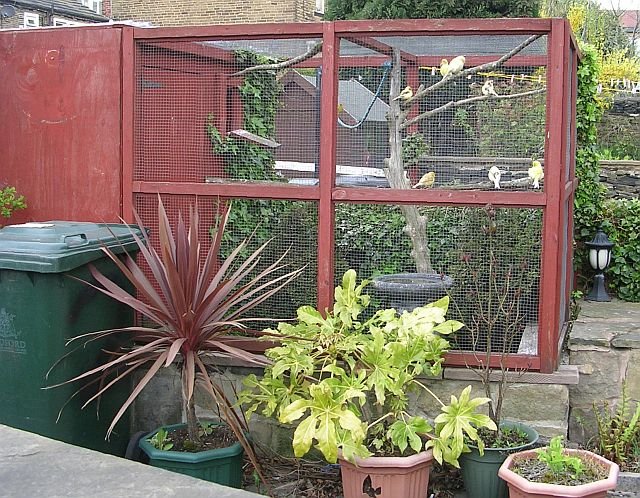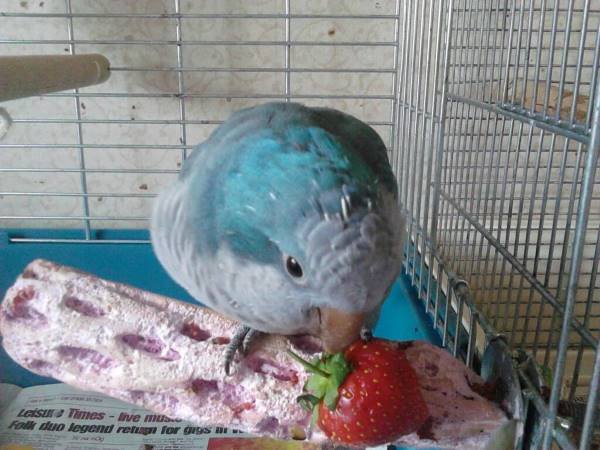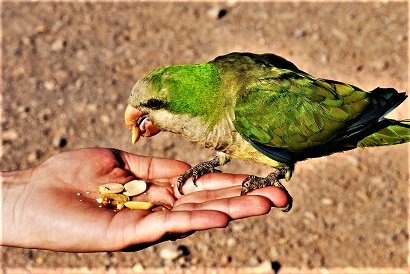Quaker Parrots are extremely playful and vibrant species. They possess the capabilities to charge you up with their abundant energy. To maintain these energy levels and to provide them with a good quality of life, it is important to take care of their health. A healthy Quaker will be able to live a fulfilling life enjoying it to the fullest.
Mental Health
When you first bring in a new Quaker parrot home, the first two weeks of your interaction plays an important role in the development of your relationship. You need to handle your new bird by observing his behavior. Depending on the experiences he had in the past, he might have developed a certain personality. You need to understand his fear levels and his comfort level with human beings.
Handling your little Quaker carefully and appropriately helps in maintaining his mental health. Quaker parrots are very social and engaging species requiring constant stimulation. The wild Quakers receive this stimulation naturally from nature. Their social needs are also met by interacting with their flock-mates. But at home, Quakers need extra care and attention because they are alone here and don’t have any flock-mates to rely on.

Giving sufficient time to them daily and interacting with them is important to keep them healthy and happy. When they are alone at home, it is best to keep them stimulated and engaged with the help of Quaker toys. Another helpful action would include the use of television to keep them entertained when we are away. Leaving some good music on, before leaving the house, can also help.
When Quaker parrots do not receive enough attention from their owners and are not getting required stimulation from other activities, they start feeling sad. With time, this sadness turns into a psychological disorder and is detrimental to the overall health of the pet. If you have not been able to give enough time to your pet parrot and subsequently notice some changes in his behavior, there are chances of him developing a mental disorder due to constant neglect. Ensure to attend to all his needs on a priority basis or you will lose your Quaker to a psychological disorder.
Physical Health
Maintaining good physical health of pet Quaker is important for the pet owners. A physically healthy Quaker enjoys a longer life.
Diet
Quakers need to have a balanced diet containing fruits and vegetables. All fruits should be pitted before serving and seeds should be removed. Seeds of some fruits are toxic to Quakers, so it is better to avoid them. Vegetables including greens are a good source of anti-oxidants. Pellet mixes are also a source of many nutrients for them. Good quality seed mixes shall form an important part of their diet. Quakers love seeds and these can, therefore, be used as treats by the owner. A cuttlefish bone provides for calcium deficiencies and helps in maintaining beak and nail health. They also need fresh drinking water daily.
Some foods are toxic to the health of Quakers and must be avoided at all costs. This includes apple seeds, alcohol, avocado, chocolate, onions, lemons among others. A seed-only diet leads Quaker to obesity. Please consult your specialized veterinary for the full list of toxic foods and ask for the amounts of milk products that can be offered to the Quaker, as they are lactose intolerant.
Exercise
A good amount of physical exercise is necessary for all living beings to remain healthy. Quaker parrots are no different. If sufficient space is not available for them to meet their flight needs, they are exposed to developing heart diseases, obesity, stiff joints, high-stress levels, and behavioral problems. Such serious conditions can lead to a bird’s death, if not attended well on time.
More about Quaker parrot Health problems
Therefore, ensure to provide enough room to your Quaker to spread his wings inside the cage and jump from one perch to another. Stretching is important for Quakers for their complete physical movement. Also provide for various toys in the cage, like ladders, swings, climbs, etc. for promoting physical stimulation.

Allow him to fly outside the cage for some time daily in your supervision. Playing games with him also help a lot in keeping the Quaker healthy. Hide and seek, chasing, dancing are some of their favorites. A separate play area can be built for them outside for free movements. Physical activity can be increased by hiding their favorite food treats at different levels in this play area. Pet Quaker can also be taken out for flying with his harness on.
Sunlight/Full Spectrum Light
Quaker parrots need to get exposed to sunlight for their bodily requirements. Sunlight helps them in the formation of vitamin-D which is essential for maintaining calcium and phosphorous levels in their bodies. The need for exposure to sunlight is fulfilled automatically for the wild Quakers, but special measures need to be taken in case of pet ones.
Regular trips outside in the natural sunlight are the most effective way to help them receive proper light. If for any reason, it is not possible to take your Quaker out in the sunlight, it is advised to provide him with full-spectrum light to avoid any health problems. There are special bulbs that produce this light and similar wavelengths are created to cope with the absence of natural light.
Sanitation and Cleanliness
The sanitation needs of wild Quakers are met by nature itself. Natural water bodies and rainwater keep them clean. They eat fresh food directly from the trees and crops. But maintaining the cleanliness of pet Quakers is our responsibility.
It is important to clean their cages regularly. All the cage accessories including toys should also be cleaned. Replace the food and water dish with a clean one daily. Keeping a bath routine is also essential to prevent building up of germs and bacteria. The poop droppings should be cleaned regularly for maintaining a healthy living environment. Quaker parrots love taking showers and seeing them shaking their tail merrily after a bath is a rewarding experience.
Signs of a healthy Quaker
Since Quakers are an intelligent species and need the stimulation of their minds all the time, they will remain curious about everything.
Such lively and curious behavior is very normal. Other signs of a healthy Quaker involves smooth feathers, normal fluffs by him, moderate levels of breathing, good mood and some talks and chirps.
Common Health Concerns
A few common health problems faced by the Quaker involve tattered feathers, unusual sleep patterns, decreased appetite, runny stool, discharge from their nostrils, fatty liver disease and behavioral changes. Quaker parrots also become overweight if kept on a seed-only diet. Also, common cold and sneezing are very normal for Quakers, so it is better to keep the medicines for this problem in his first-aid box beforehand.

Some serious health issues involve gout which occurs due to calcification of kidneys. An insufficient amount of calcium in their diet can result in the development of gout in Quakers. A calcium-enriched cuttlefish bone can be hung by the side of their cage. It acts as a toy for them along with a source of calcium.
Preventive Measures
Almost all the Quaker diseases sprung from air-borne germs. They can be avoided by keeping the Quaker’s surroundings clean. Preventing contamination will surely help to avoid the occurrence of many diseases. Getting your Quaker regularly scrutinized from a professional veterinary also plays an important part in identifying diseases at an early stage.
Maintaining good interaction levels and spending sufficient time with him will keep him healthy for years to come. Also, ensure to add a new bird to your old bird’s cage only after a complete medical check-up for any diseases. Keep the new bird in a separate room until the tests are done and avoid cross-contamination by using separate food and water bowls for these birds. Do not share toys or any other cage accessories between them.
Conclusion
Prevention is always better than cure. It is helpful to notice physical changes taking place in your pet Quaker. Excessive preening leading to missing patches of feather could be a sign of parasite breeding on his body, trembling can happen due to fever or a shock, ruffled feathers relate to lethargy in the Quaker, difficulty in breathing suggests a respiratory problem, drainage from nostrils or eyes occur due to sinusitis or respiratory issues, change in color of poop hints towards digestive problems and changes in eye color is due to an eye infection or cataracts.
All these signs require our immediate attention and measures should be taken to prevent the spreading of disease. Take him to the veterinary for an in-depth examination of the problem. Medical treatment during the initial stages of disease development helps in curing the bird effectively. So, follow the instructions given by the vet properly and provide for all the prescribed medications. Ask for any changes in the diet of your pet to help him recover fast.
Quaker parrots are known to live for an average of 20 to 30 years. But, with some extra love and care, they can survive for more than 30 years too. Taking care of them just like we do for any other of our family members will ensure longer and healthier lives for them.




